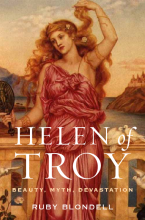This book examines Helen of Troy in ancient Greek mythology and literature. It focusses especially on her supreme beauty and its consequences, which make Helen central to many aspects of Greek culture. As the most beautiful woman in the world, who causes the greatest war of all time, she embodies the intrinsic ambiguity of the female. As the ultimate object of desire (eros), who pursues desires of her own, she models the position of women as objects with agency. As the iconic errant wife, who must be retrieved, she is the foundation of Greek masculinity, in so far as this is grounded in the control of women. As a woman who ran off with a non-Greek or "barbarian," she is a vehicle for defining Greek identity. As the cause of the Trojan War, she also causes its commemoration in song and story, making her a kind of Muse. Accordingly, authors in every period and genre use Helen and her story to wrestle not only with women, beauty, and the legendary past, but with questions of Greek identity, female subjectivity, human agency, and the power of discourse. The book begins with two chapters establishing the cultural framework for these concerns, the first on Greek gender ideology and attitudes towards beauty and eros, as enshrined in the "beautiful evil" Pandora, the second on the myth and cult of Helen. Subsequent chapters provide detailed studies of all surviving archaic and classical Greek texts in which Helen has a significant presence.
